Effective Communication Strategy Analysis for Sports Love Hotel
VerifiedAdded on 2021/01/01
|8
|2172
|482
Report
AI Summary
This report provides a comprehensive analysis of communication strategies within the context of Sports Love Hotel, a small hotel in London. It begins with an introduction to the importance of effective communication in the workplace, highlighting the impact of poor communication on customer experience. The literature review explores the principles and purposes that the HR director should consider when formulating a communication strategy, including clarity, attention, feedback, informality, consistency, timeliness, and adequacy. The report also examines the characteristics of good listeners and speakers during meetings, emphasizing confidence, authenticity, interactivity, and audience connection for speakers, and non-interruption, full attention, acceptance, and patience for listeners. The analysis and discussion section reiterates these principles and characteristics, followed by a self-evaluation of the author's strengths and weaknesses in oral and written communication. The report concludes by summarizing the importance of effective communication for smooth business operations and improved customer experience. The report uses various academic sources to support its claims and provides a detailed overview of the subject matter.
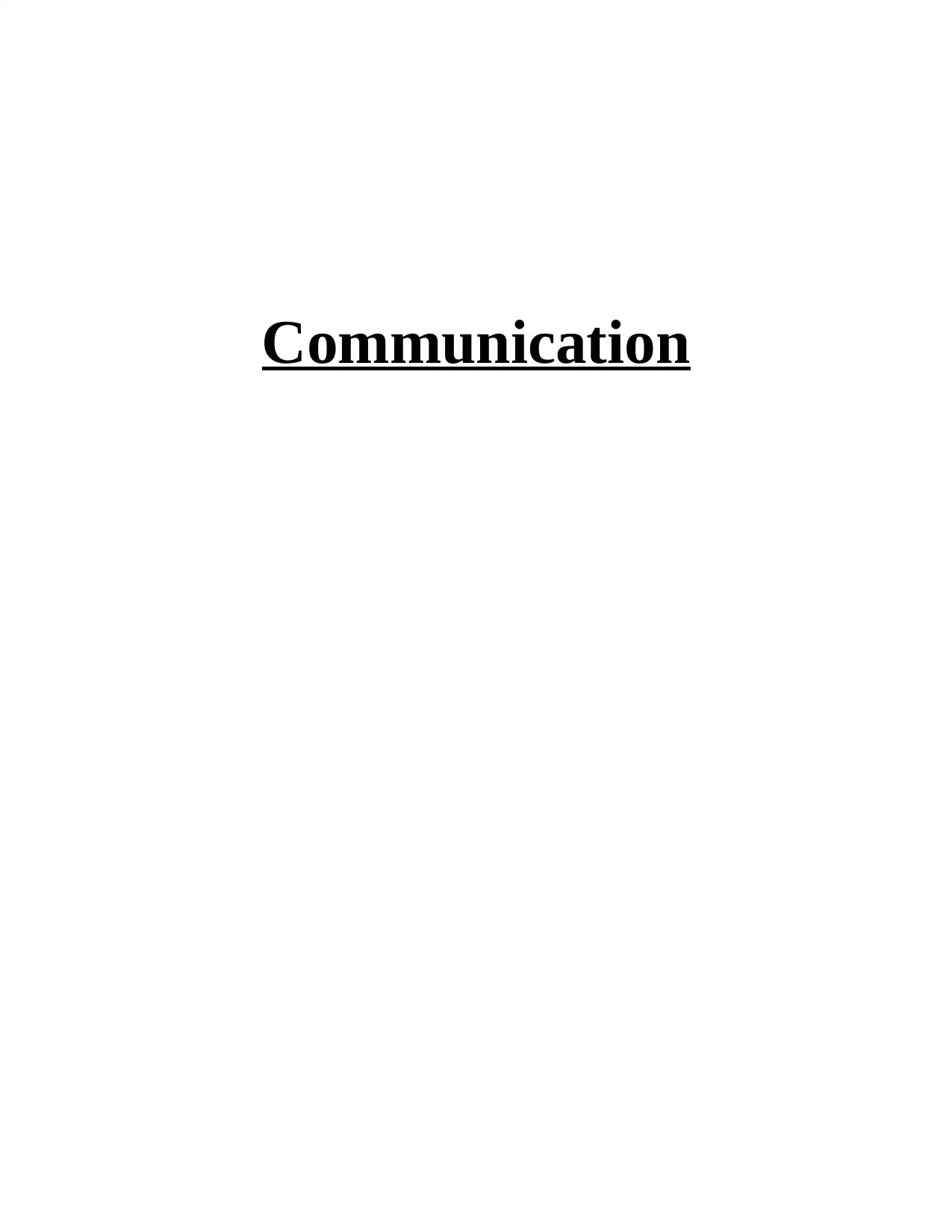
Communication
Paraphrase This Document
Need a fresh take? Get an instant paraphrase of this document with our AI Paraphraser
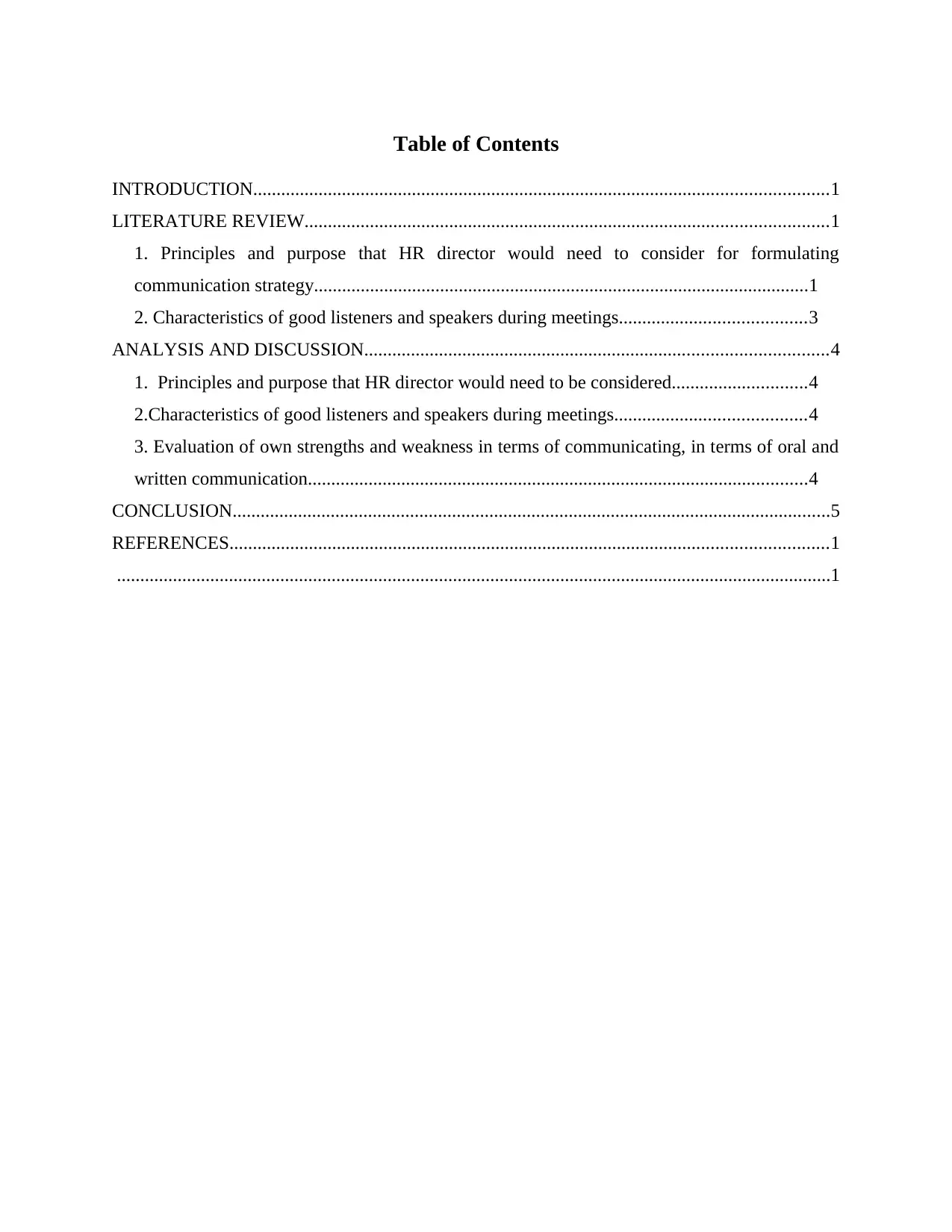
Table of Contents
INTRODUCTION...........................................................................................................................1
LITERATURE REVIEW................................................................................................................1
1. Principles and purpose that HR director would need to consider for formulating
communication strategy..........................................................................................................1
2. Characteristics of good listeners and speakers during meetings........................................3
ANALYSIS AND DISCUSSION...................................................................................................4
1. Principles and purpose that HR director would need to be considered.............................4
2.Characteristics of good listeners and speakers during meetings.........................................4
3. Evaluation of own strengths and weakness in terms of communicating, in terms of oral and
written communication...........................................................................................................4
CONCLUSION................................................................................................................................5
REFERENCES................................................................................................................................1
.........................................................................................................................................................1
INTRODUCTION...........................................................................................................................1
LITERATURE REVIEW................................................................................................................1
1. Principles and purpose that HR director would need to consider for formulating
communication strategy..........................................................................................................1
2. Characteristics of good listeners and speakers during meetings........................................3
ANALYSIS AND DISCUSSION...................................................................................................4
1. Principles and purpose that HR director would need to be considered.............................4
2.Characteristics of good listeners and speakers during meetings.........................................4
3. Evaluation of own strengths and weakness in terms of communicating, in terms of oral and
written communication...........................................................................................................4
CONCLUSION................................................................................................................................5
REFERENCES................................................................................................................................1
.........................................................................................................................................................1
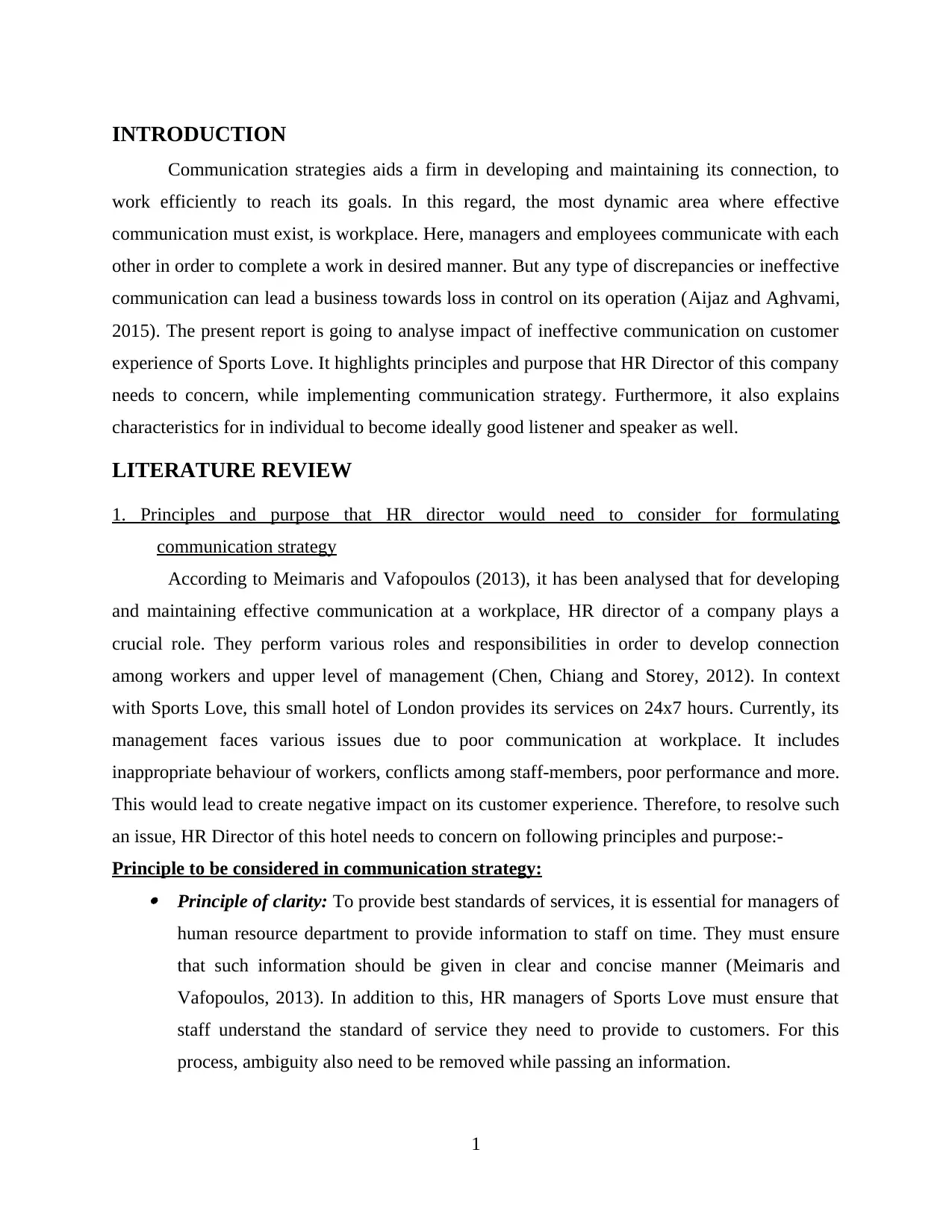
INTRODUCTION
Communication strategies aids a firm in developing and maintaining its connection, to
work efficiently to reach its goals. In this regard, the most dynamic area where effective
communication must exist, is workplace. Here, managers and employees communicate with each
other in order to complete a work in desired manner. But any type of discrepancies or ineffective
communication can lead a business towards loss in control on its operation (Aijaz and Aghvami,
2015). The present report is going to analyse impact of ineffective communication on customer
experience of Sports Love. It highlights principles and purpose that HR Director of this company
needs to concern, while implementing communication strategy. Furthermore, it also explains
characteristics for in individual to become ideally good listener and speaker as well.
LITERATURE REVIEW
1. Principles and purpose that HR director would need to consider for formulating
communication strategy
According to Meimaris and Vafopoulos (2013), it has been analysed that for developing
and maintaining effective communication at a workplace, HR director of a company plays a
crucial role. They perform various roles and responsibilities in order to develop connection
among workers and upper level of management (Chen, Chiang and Storey, 2012). In context
with Sports Love, this small hotel of London provides its services on 24x7 hours. Currently, its
management faces various issues due to poor communication at workplace. It includes
inappropriate behaviour of workers, conflicts among staff-members, poor performance and more.
This would lead to create negative impact on its customer experience. Therefore, to resolve such
an issue, HR Director of this hotel needs to concern on following principles and purpose:-
Principle to be considered in communication strategy: Principle of clarity: To provide best standards of services, it is essential for managers of
human resource department to provide information to staff on time. They must ensure
that such information should be given in clear and concise manner (Meimaris and
Vafopoulos, 2013). In addition to this, HR managers of Sports Love must ensure that
staff understand the standard of service they need to provide to customers. For this
process, ambiguity also need to be removed while passing an information.
1
Communication strategies aids a firm in developing and maintaining its connection, to
work efficiently to reach its goals. In this regard, the most dynamic area where effective
communication must exist, is workplace. Here, managers and employees communicate with each
other in order to complete a work in desired manner. But any type of discrepancies or ineffective
communication can lead a business towards loss in control on its operation (Aijaz and Aghvami,
2015). The present report is going to analyse impact of ineffective communication on customer
experience of Sports Love. It highlights principles and purpose that HR Director of this company
needs to concern, while implementing communication strategy. Furthermore, it also explains
characteristics for in individual to become ideally good listener and speaker as well.
LITERATURE REVIEW
1. Principles and purpose that HR director would need to consider for formulating
communication strategy
According to Meimaris and Vafopoulos (2013), it has been analysed that for developing
and maintaining effective communication at a workplace, HR director of a company plays a
crucial role. They perform various roles and responsibilities in order to develop connection
among workers and upper level of management (Chen, Chiang and Storey, 2012). In context
with Sports Love, this small hotel of London provides its services on 24x7 hours. Currently, its
management faces various issues due to poor communication at workplace. It includes
inappropriate behaviour of workers, conflicts among staff-members, poor performance and more.
This would lead to create negative impact on its customer experience. Therefore, to resolve such
an issue, HR Director of this hotel needs to concern on following principles and purpose:-
Principle to be considered in communication strategy: Principle of clarity: To provide best standards of services, it is essential for managers of
human resource department to provide information to staff on time. They must ensure
that such information should be given in clear and concise manner (Meimaris and
Vafopoulos, 2013). In addition to this, HR managers of Sports Love must ensure that
staff understand the standard of service they need to provide to customers. For this
process, ambiguity also need to be removed while passing an information.
1
⊘ This is a preview!⊘
Do you want full access?
Subscribe today to unlock all pages.

Trusted by 1+ million students worldwide
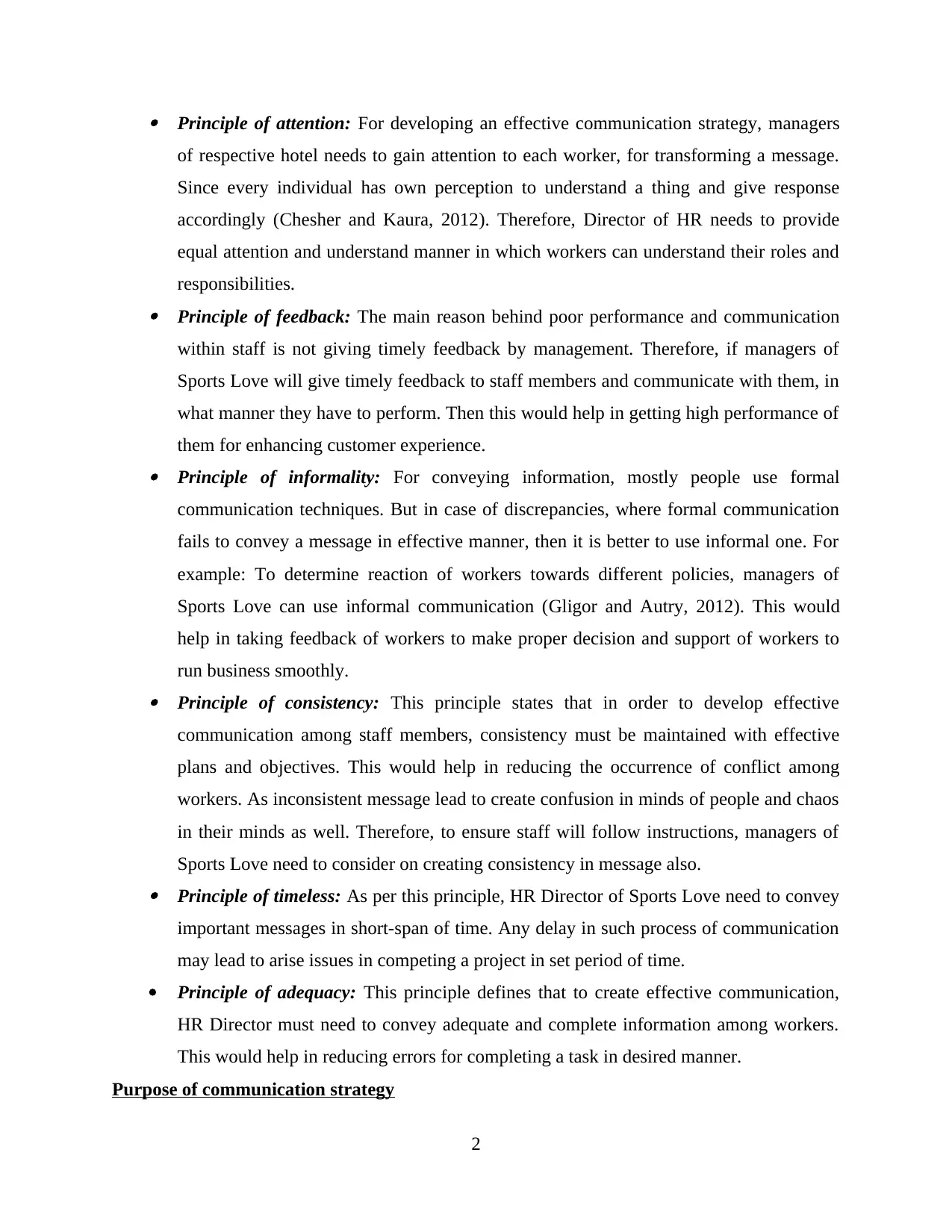
Principle of attention: For developing an effective communication strategy, managers
of respective hotel needs to gain attention to each worker, for transforming a message.
Since every individual has own perception to understand a thing and give response
accordingly (Chesher and Kaura, 2012). Therefore, Director of HR needs to provide
equal attention and understand manner in which workers can understand their roles and
responsibilities. Principle of feedback: The main reason behind poor performance and communication
within staff is not giving timely feedback by management. Therefore, if managers of
Sports Love will give timely feedback to staff members and communicate with them, in
what manner they have to perform. Then this would help in getting high performance of
them for enhancing customer experience. Principle of informality: For conveying information, mostly people use formal
communication techniques. But in case of discrepancies, where formal communication
fails to convey a message in effective manner, then it is better to use informal one. For
example: To determine reaction of workers towards different policies, managers of
Sports Love can use informal communication (Gligor and Autry, 2012). This would
help in taking feedback of workers to make proper decision and support of workers to
run business smoothly. Principle of consistency: This principle states that in order to develop effective
communication among staff members, consistency must be maintained with effective
plans and objectives. This would help in reducing the occurrence of conflict among
workers. As inconsistent message lead to create confusion in minds of people and chaos
in their minds as well. Therefore, to ensure staff will follow instructions, managers of
Sports Love need to consider on creating consistency in message also. Principle of timeless: As per this principle, HR Director of Sports Love need to convey
important messages in short-span of time. Any delay in such process of communication
may lead to arise issues in competing a project in set period of time.
Principle of adequacy: This principle defines that to create effective communication,
HR Director must need to convey adequate and complete information among workers.
This would help in reducing errors for completing a task in desired manner.
Purpose of communication strategy
2
of respective hotel needs to gain attention to each worker, for transforming a message.
Since every individual has own perception to understand a thing and give response
accordingly (Chesher and Kaura, 2012). Therefore, Director of HR needs to provide
equal attention and understand manner in which workers can understand their roles and
responsibilities. Principle of feedback: The main reason behind poor performance and communication
within staff is not giving timely feedback by management. Therefore, if managers of
Sports Love will give timely feedback to staff members and communicate with them, in
what manner they have to perform. Then this would help in getting high performance of
them for enhancing customer experience. Principle of informality: For conveying information, mostly people use formal
communication techniques. But in case of discrepancies, where formal communication
fails to convey a message in effective manner, then it is better to use informal one. For
example: To determine reaction of workers towards different policies, managers of
Sports Love can use informal communication (Gligor and Autry, 2012). This would
help in taking feedback of workers to make proper decision and support of workers to
run business smoothly. Principle of consistency: This principle states that in order to develop effective
communication among staff members, consistency must be maintained with effective
plans and objectives. This would help in reducing the occurrence of conflict among
workers. As inconsistent message lead to create confusion in minds of people and chaos
in their minds as well. Therefore, to ensure staff will follow instructions, managers of
Sports Love need to consider on creating consistency in message also. Principle of timeless: As per this principle, HR Director of Sports Love need to convey
important messages in short-span of time. Any delay in such process of communication
may lead to arise issues in competing a project in set period of time.
Principle of adequacy: This principle defines that to create effective communication,
HR Director must need to convey adequate and complete information among workers.
This would help in reducing errors for completing a task in desired manner.
Purpose of communication strategy
2
Paraphrase This Document
Need a fresh take? Get an instant paraphrase of this document with our AI Paraphraser
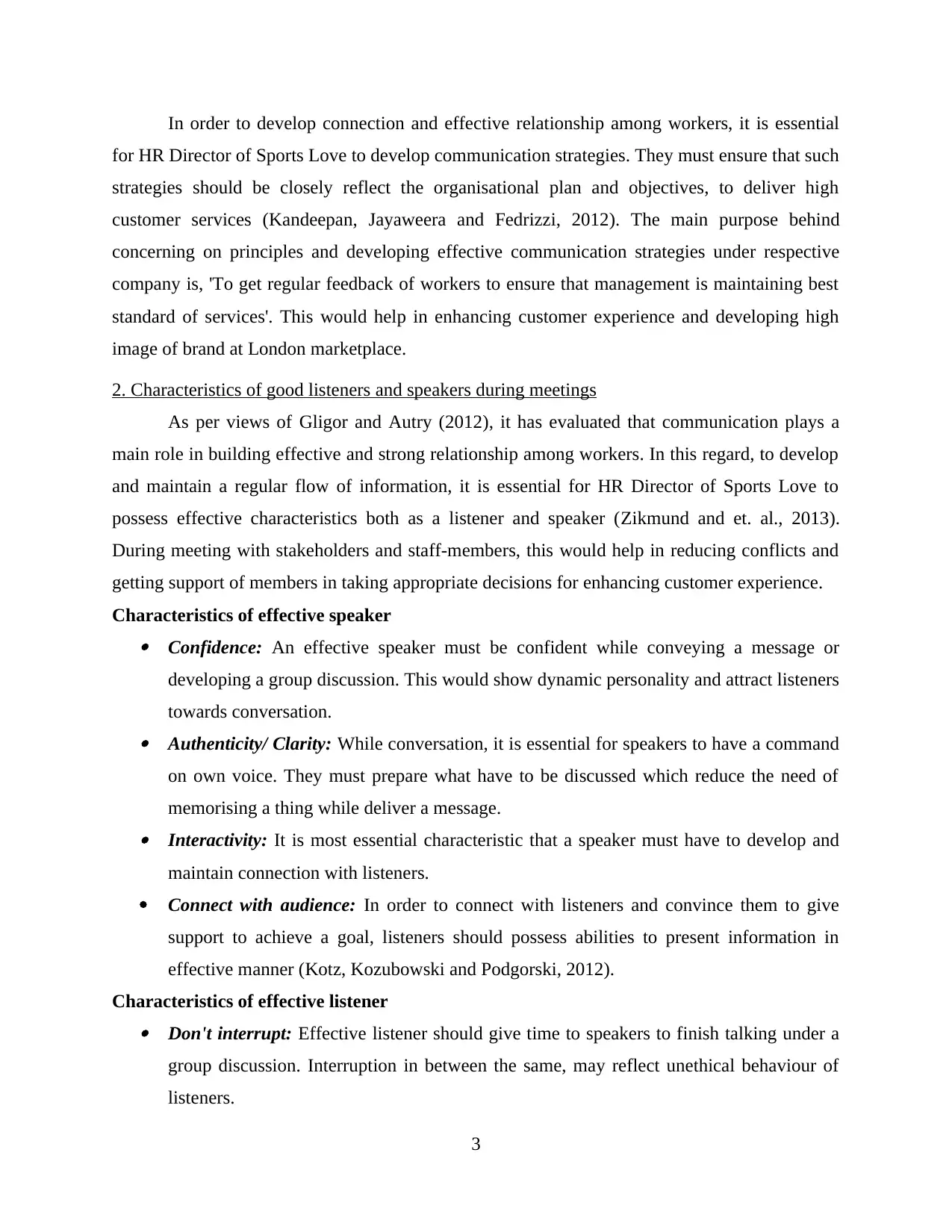
In order to develop connection and effective relationship among workers, it is essential
for HR Director of Sports Love to develop communication strategies. They must ensure that such
strategies should be closely reflect the organisational plan and objectives, to deliver high
customer services (Kandeepan, Jayaweera and Fedrizzi, 2012). The main purpose behind
concerning on principles and developing effective communication strategies under respective
company is, 'To get regular feedback of workers to ensure that management is maintaining best
standard of services'. This would help in enhancing customer experience and developing high
image of brand at London marketplace.
2. Characteristics of good listeners and speakers during meetings
As per views of Gligor and Autry (2012), it has evaluated that communication plays a
main role in building effective and strong relationship among workers. In this regard, to develop
and maintain a regular flow of information, it is essential for HR Director of Sports Love to
possess effective characteristics both as a listener and speaker (Zikmund and et. al., 2013).
During meeting with stakeholders and staff-members, this would help in reducing conflicts and
getting support of members in taking appropriate decisions for enhancing customer experience.
Characteristics of effective speaker Confidence: An effective speaker must be confident while conveying a message or
developing a group discussion. This would show dynamic personality and attract listeners
towards conversation. Authenticity/ Clarity: While conversation, it is essential for speakers to have a command
on own voice. They must prepare what have to be discussed which reduce the need of
memorising a thing while deliver a message. Interactivity: It is most essential characteristic that a speaker must have to develop and
maintain connection with listeners.
Connect with audience: In order to connect with listeners and convince them to give
support to achieve a goal, listeners should possess abilities to present information in
effective manner (Kotz, Kozubowski and Podgorski, 2012).
Characteristics of effective listener Don't interrupt: Effective listener should give time to speakers to finish talking under a
group discussion. Interruption in between the same, may reflect unethical behaviour of
listeners.
3
for HR Director of Sports Love to develop communication strategies. They must ensure that such
strategies should be closely reflect the organisational plan and objectives, to deliver high
customer services (Kandeepan, Jayaweera and Fedrizzi, 2012). The main purpose behind
concerning on principles and developing effective communication strategies under respective
company is, 'To get regular feedback of workers to ensure that management is maintaining best
standard of services'. This would help in enhancing customer experience and developing high
image of brand at London marketplace.
2. Characteristics of good listeners and speakers during meetings
As per views of Gligor and Autry (2012), it has evaluated that communication plays a
main role in building effective and strong relationship among workers. In this regard, to develop
and maintain a regular flow of information, it is essential for HR Director of Sports Love to
possess effective characteristics both as a listener and speaker (Zikmund and et. al., 2013).
During meeting with stakeholders and staff-members, this would help in reducing conflicts and
getting support of members in taking appropriate decisions for enhancing customer experience.
Characteristics of effective speaker Confidence: An effective speaker must be confident while conveying a message or
developing a group discussion. This would show dynamic personality and attract listeners
towards conversation. Authenticity/ Clarity: While conversation, it is essential for speakers to have a command
on own voice. They must prepare what have to be discussed which reduce the need of
memorising a thing while deliver a message. Interactivity: It is most essential characteristic that a speaker must have to develop and
maintain connection with listeners.
Connect with audience: In order to connect with listeners and convince them to give
support to achieve a goal, listeners should possess abilities to present information in
effective manner (Kotz, Kozubowski and Podgorski, 2012).
Characteristics of effective listener Don't interrupt: Effective listener should give time to speakers to finish talking under a
group discussion. Interruption in between the same, may reflect unethical behaviour of
listeners.
3
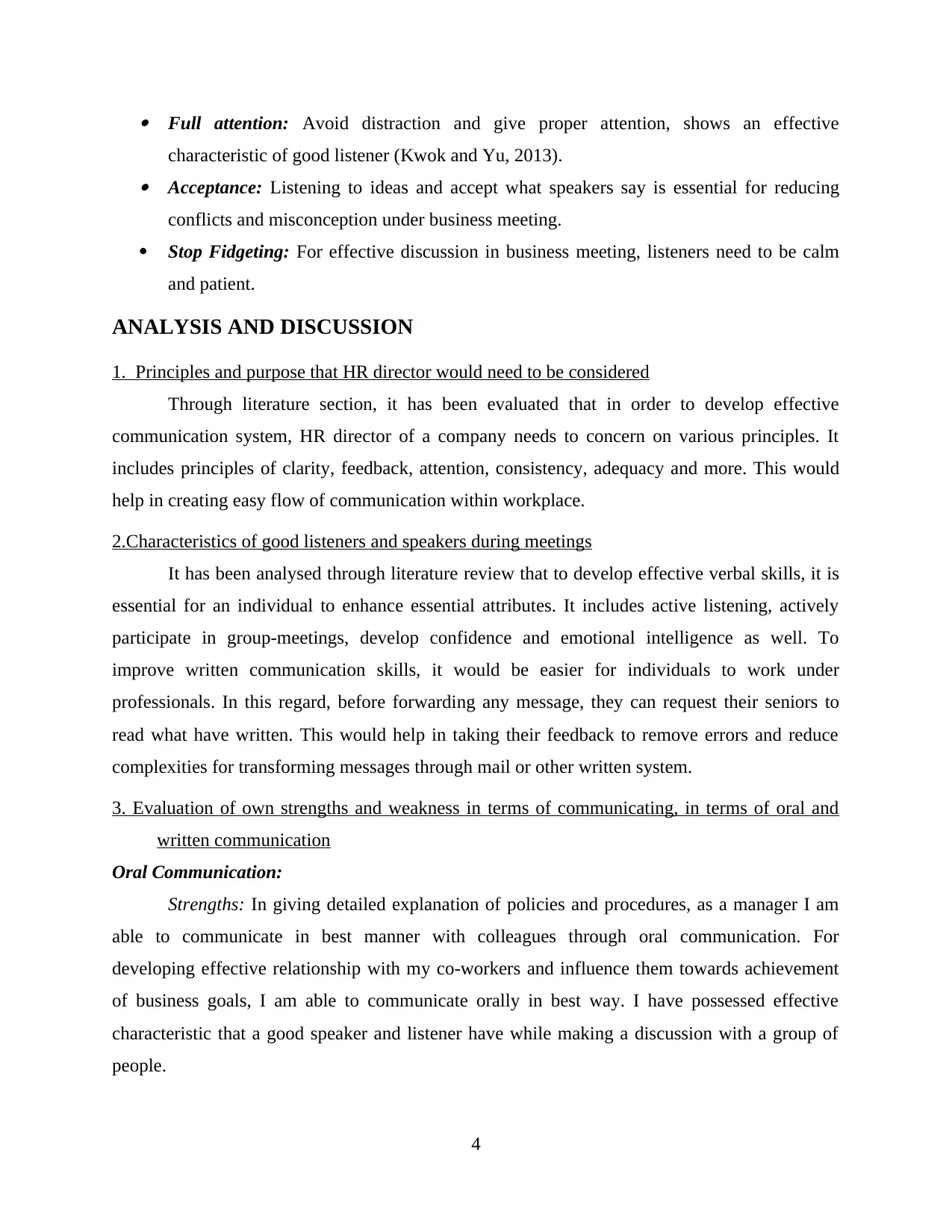
Full attention: Avoid distraction and give proper attention, shows an effective
characteristic of good listener (Kwok and Yu, 2013). Acceptance: Listening to ideas and accept what speakers say is essential for reducing
conflicts and misconception under business meeting.
Stop Fidgeting: For effective discussion in business meeting, listeners need to be calm
and patient.
ANALYSIS AND DISCUSSION
1. Principles and purpose that HR director would need to be considered
Through literature section, it has been evaluated that in order to develop effective
communication system, HR director of a company needs to concern on various principles. It
includes principles of clarity, feedback, attention, consistency, adequacy and more. This would
help in creating easy flow of communication within workplace.
2.Characteristics of good listeners and speakers during meetings
It has been analysed through literature review that to develop effective verbal skills, it is
essential for an individual to enhance essential attributes. It includes active listening, actively
participate in group-meetings, develop confidence and emotional intelligence as well. To
improve written communication skills, it would be easier for individuals to work under
professionals. In this regard, before forwarding any message, they can request their seniors to
read what have written. This would help in taking their feedback to remove errors and reduce
complexities for transforming messages through mail or other written system.
3. Evaluation of own strengths and weakness in terms of communicating, in terms of oral and
written communication
Oral Communication:
Strengths: In giving detailed explanation of policies and procedures, as a manager I am
able to communicate in best manner with colleagues through oral communication. For
developing effective relationship with my co-workers and influence them towards achievement
of business goals, I am able to communicate orally in best way. I have possessed effective
characteristic that a good speaker and listener have while making a discussion with a group of
people.
4
characteristic of good listener (Kwok and Yu, 2013). Acceptance: Listening to ideas and accept what speakers say is essential for reducing
conflicts and misconception under business meeting.
Stop Fidgeting: For effective discussion in business meeting, listeners need to be calm
and patient.
ANALYSIS AND DISCUSSION
1. Principles and purpose that HR director would need to be considered
Through literature section, it has been evaluated that in order to develop effective
communication system, HR director of a company needs to concern on various principles. It
includes principles of clarity, feedback, attention, consistency, adequacy and more. This would
help in creating easy flow of communication within workplace.
2.Characteristics of good listeners and speakers during meetings
It has been analysed through literature review that to develop effective verbal skills, it is
essential for an individual to enhance essential attributes. It includes active listening, actively
participate in group-meetings, develop confidence and emotional intelligence as well. To
improve written communication skills, it would be easier for individuals to work under
professionals. In this regard, before forwarding any message, they can request their seniors to
read what have written. This would help in taking their feedback to remove errors and reduce
complexities for transforming messages through mail or other written system.
3. Evaluation of own strengths and weakness in terms of communicating, in terms of oral and
written communication
Oral Communication:
Strengths: In giving detailed explanation of policies and procedures, as a manager I am
able to communicate in best manner with colleagues through oral communication. For
developing effective relationship with my co-workers and influence them towards achievement
of business goals, I am able to communicate orally in best way. I have possessed effective
characteristic that a good speaker and listener have while making a discussion with a group of
people.
4
⊘ This is a preview!⊘
Do you want full access?
Subscribe today to unlock all pages.

Trusted by 1+ million students worldwide
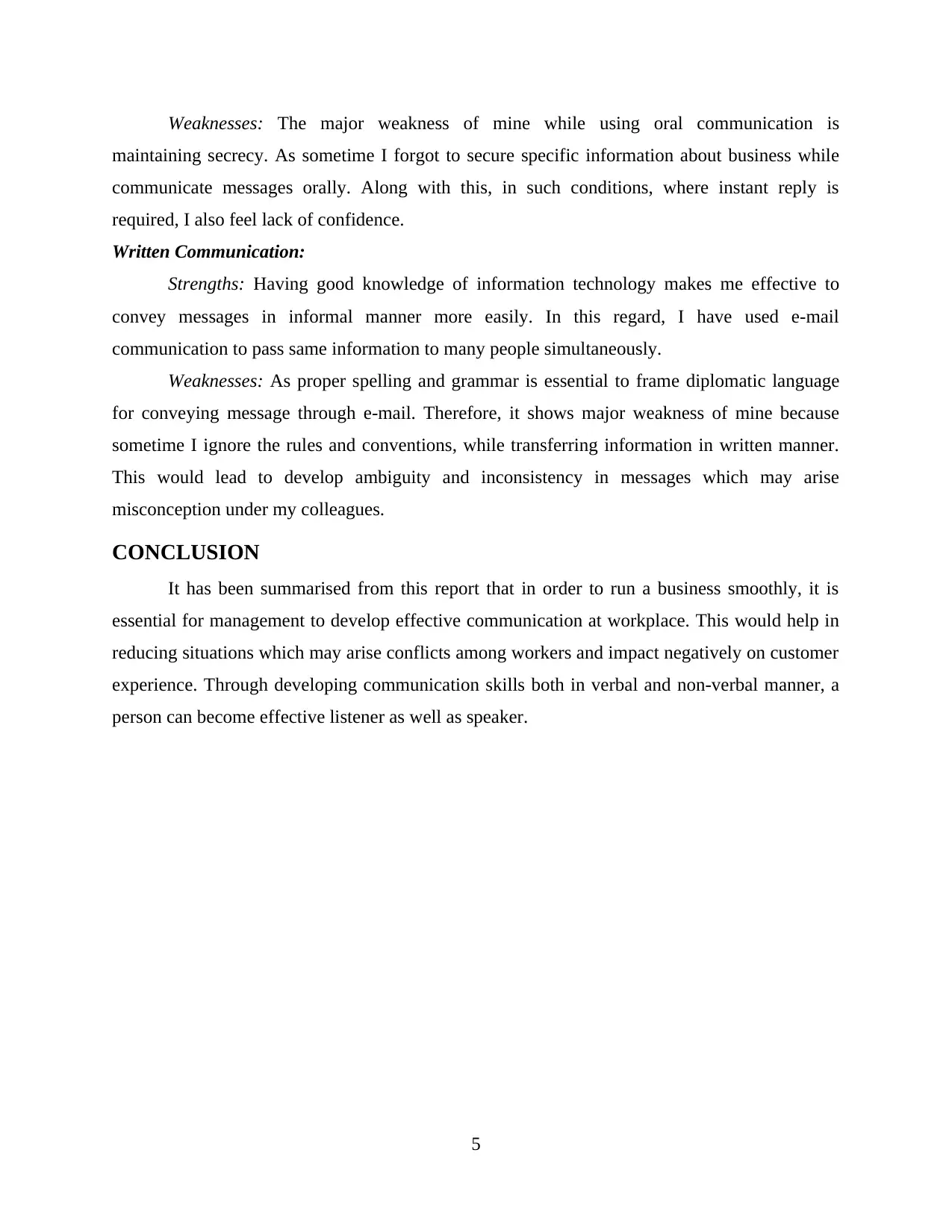
Weaknesses: The major weakness of mine while using oral communication is
maintaining secrecy. As sometime I forgot to secure specific information about business while
communicate messages orally. Along with this, in such conditions, where instant reply is
required, I also feel lack of confidence.
Written Communication:
Strengths: Having good knowledge of information technology makes me effective to
convey messages in informal manner more easily. In this regard, I have used e-mail
communication to pass same information to many people simultaneously.
Weaknesses: As proper spelling and grammar is essential to frame diplomatic language
for conveying message through e-mail. Therefore, it shows major weakness of mine because
sometime I ignore the rules and conventions, while transferring information in written manner.
This would lead to develop ambiguity and inconsistency in messages which may arise
misconception under my colleagues.
CONCLUSION
It has been summarised from this report that in order to run a business smoothly, it is
essential for management to develop effective communication at workplace. This would help in
reducing situations which may arise conflicts among workers and impact negatively on customer
experience. Through developing communication skills both in verbal and non-verbal manner, a
person can become effective listener as well as speaker.
5
maintaining secrecy. As sometime I forgot to secure specific information about business while
communicate messages orally. Along with this, in such conditions, where instant reply is
required, I also feel lack of confidence.
Written Communication:
Strengths: Having good knowledge of information technology makes me effective to
convey messages in informal manner more easily. In this regard, I have used e-mail
communication to pass same information to many people simultaneously.
Weaknesses: As proper spelling and grammar is essential to frame diplomatic language
for conveying message through e-mail. Therefore, it shows major weakness of mine because
sometime I ignore the rules and conventions, while transferring information in written manner.
This would lead to develop ambiguity and inconsistency in messages which may arise
misconception under my colleagues.
CONCLUSION
It has been summarised from this report that in order to run a business smoothly, it is
essential for management to develop effective communication at workplace. This would help in
reducing situations which may arise conflicts among workers and impact negatively on customer
experience. Through developing communication skills both in verbal and non-verbal manner, a
person can become effective listener as well as speaker.
5
Paraphrase This Document
Need a fresh take? Get an instant paraphrase of this document with our AI Paraphraser
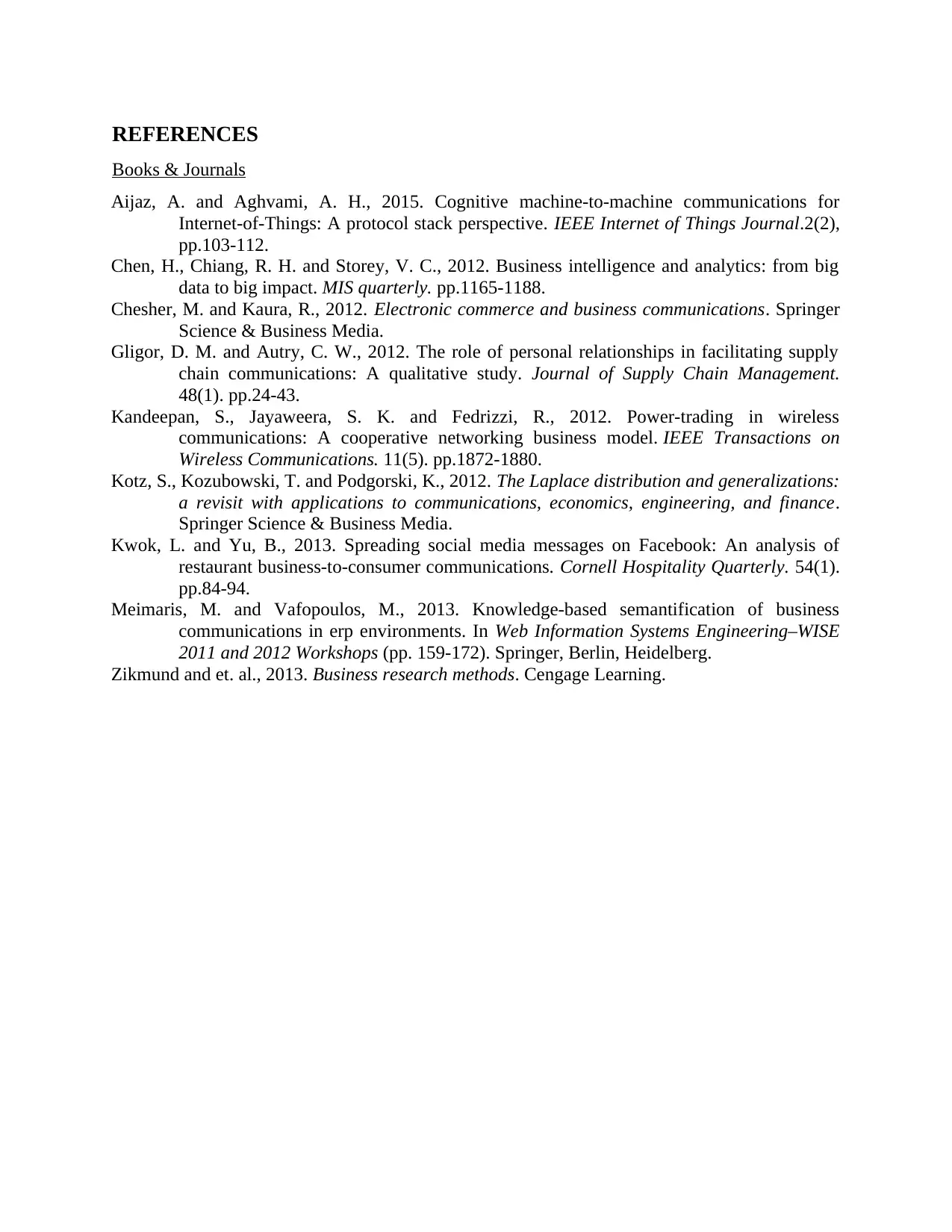
REFERENCES
Books & Journals
Aijaz, A. and Aghvami, A. H., 2015. Cognitive machine-to-machine communications for
Internet-of-Things: A protocol stack perspective. IEEE Internet of Things Journal.2(2),
pp.103-112.
Chen, H., Chiang, R. H. and Storey, V. C., 2012. Business intelligence and analytics: from big
data to big impact. MIS quarterly. pp.1165-1188.
Chesher, M. and Kaura, R., 2012. Electronic commerce and business communications. Springer
Science & Business Media.
Gligor, D. M. and Autry, C. W., 2012. The role of personal relationships in facilitating supply
chain communications: A qualitative study. Journal of Supply Chain Management.
48(1). pp.24-43.
Kandeepan, S., Jayaweera, S. K. and Fedrizzi, R., 2012. Power-trading in wireless
communications: A cooperative networking business model. IEEE Transactions on
Wireless Communications. 11(5). pp.1872-1880.
Kotz, S., Kozubowski, T. and Podgorski, K., 2012. The Laplace distribution and generalizations:
a revisit with applications to communications, economics, engineering, and finance.
Springer Science & Business Media.
Kwok, L. and Yu, B., 2013. Spreading social media messages on Facebook: An analysis of
restaurant business-to-consumer communications. Cornell Hospitality Quarterly. 54(1).
pp.84-94.
Meimaris, M. and Vafopoulos, M., 2013. Knowledge-based semantification of business
communications in erp environments. In Web Information Systems Engineering–WISE
2011 and 2012 Workshops (pp. 159-172). Springer, Berlin, Heidelberg.
Zikmund and et. al., 2013. Business research methods. Cengage Learning.
Books & Journals
Aijaz, A. and Aghvami, A. H., 2015. Cognitive machine-to-machine communications for
Internet-of-Things: A protocol stack perspective. IEEE Internet of Things Journal.2(2),
pp.103-112.
Chen, H., Chiang, R. H. and Storey, V. C., 2012. Business intelligence and analytics: from big
data to big impact. MIS quarterly. pp.1165-1188.
Chesher, M. and Kaura, R., 2012. Electronic commerce and business communications. Springer
Science & Business Media.
Gligor, D. M. and Autry, C. W., 2012. The role of personal relationships in facilitating supply
chain communications: A qualitative study. Journal of Supply Chain Management.
48(1). pp.24-43.
Kandeepan, S., Jayaweera, S. K. and Fedrizzi, R., 2012. Power-trading in wireless
communications: A cooperative networking business model. IEEE Transactions on
Wireless Communications. 11(5). pp.1872-1880.
Kotz, S., Kozubowski, T. and Podgorski, K., 2012. The Laplace distribution and generalizations:
a revisit with applications to communications, economics, engineering, and finance.
Springer Science & Business Media.
Kwok, L. and Yu, B., 2013. Spreading social media messages on Facebook: An analysis of
restaurant business-to-consumer communications. Cornell Hospitality Quarterly. 54(1).
pp.84-94.
Meimaris, M. and Vafopoulos, M., 2013. Knowledge-based semantification of business
communications in erp environments. In Web Information Systems Engineering–WISE
2011 and 2012 Workshops (pp. 159-172). Springer, Berlin, Heidelberg.
Zikmund and et. al., 2013. Business research methods. Cengage Learning.
1 out of 8
Related Documents
Your All-in-One AI-Powered Toolkit for Academic Success.
+13062052269
info@desklib.com
Available 24*7 on WhatsApp / Email
![[object Object]](/_next/static/media/star-bottom.7253800d.svg)
Unlock your academic potential
Copyright © 2020–2026 A2Z Services. All Rights Reserved. Developed and managed by ZUCOL.





